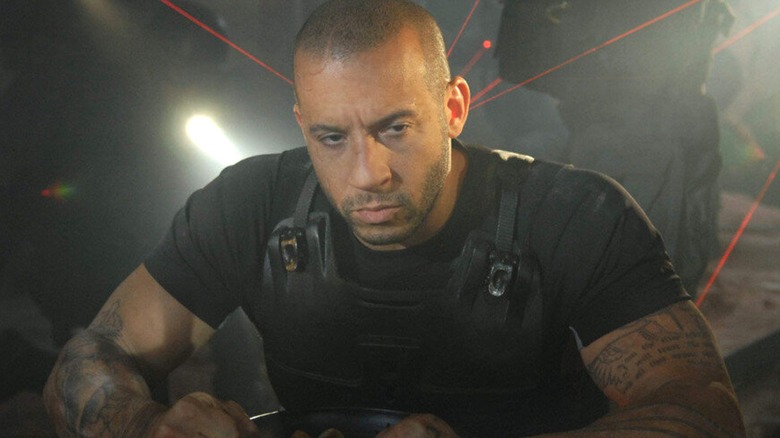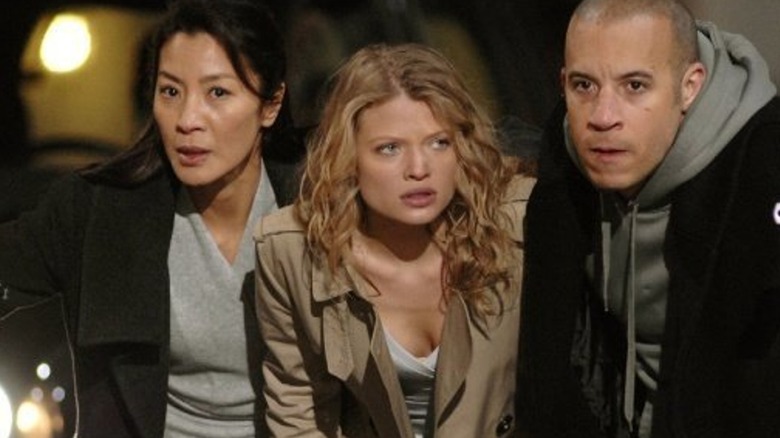Do you know which Vin Diesel movie is rated the highest on Rotten Tomatoes? It’s 1999’s “The Iron Giant,” the timeless animated classic in which Diesel voices the titular 50-ft. tall metal-eating robot, who emerges as a strong emotional anchor in the narrative. In addition to featuring stellar voice work, the film is a beautiful, engaging tale about the everyday issues that plague us, all the way down to its highly emotional climax (aka the “Superman” moment, one of the best action scenes ever). But while “The Iron Giant” sits at a thoroughly deserved 96% on Rotten Tomatoes, let’s shift our attention to the actor’s lowest-rated film on the platform. No, it’s not “The Last Witch Hunter” (although that is a strong contender for Diesel’s worst movie). Rather, it’s a sci-fi action flick that not only flopped at the box office, but whose theatrical cut was also disowned by its director. I’m talking about Mathieu Kassovitz’s wildly convoluted, mind-bogglingly outlandish “Babylon A.D,” which holds an RT score of 7% at the time of writing.
Before talking about the film in question, let’s take a quick look at the experimental French cyberpunk novel it’s loosely based on. Maurice Dantec’s “Babylon Babies” is about Marie Zorn, a surrogate mother of twins who represents hope for the next evolutionary leap for humankind. When Marie finds herself targeted by a bunch of cults whose agendas form a homogenized soup of half-baked motivations, it falls to a Flemish mercenary named Toorop to escort her to safety. Although Dantec’s novel deals with some intriguing concepts, the book is an overall confusing hodgepodge of characters and ideas (many of which are deeply obtuse), and ultimately culminates in a conclusion that is neither particularly good nor memorable.
Adapting a novel that is so experimental by nature demands farsighted discernment and a conviction to mold the source material’s glaring flaws into something better. “Babylon A.D.,” however, simply does not have the juice.
Babylon A.D. is an unsalvagable mess
I want to preface this with the acknowledgment that studio interference did prevent Kassovitz from making the movie that he wanted. The final 10-15 minutes of “Babylon A.D.” are like a fever dream, — no, not the good kind — making it clear that things were either rushed or edited to the point that everything defies logic. Mind you, the film still situates its confusing premise front and center, its lack of cohesion affecting our understanding of every character and how they navigate the movie’s dystopian New York City backdrop. Even so, I’m positive that Kassovitz’s original, unencumbered vision would been better than the one that made it to the screen. After all, he is the same filmmaker who helmed the excellent “La Haine.”
Circling back to the movie’s plot: Diesel stars here as Toorop, a mercenary/transporter who’s responsible for escorting and protecting Aurora (Mélanie Thierry), a child prodigy who was brought up by the Noelite nuns and is coveted and feared by various factions populating the film’s setting. Aurora is also clairvoyant and appears to be increasingly agitated by the escalating strife and instability gripping the world, including unchecked global warming and overpopulation. The futuristic society of “Babylon A.D.” isn’t fleshed out much beyond these details, though, save for the occasional glimpses of advanced tech (which include neck-implanted passports and slick video call screens), which mostly serve to underline the grimy, cyberpunk nature of this world.
The biggest problem with “Babylon A.D.” is that it doesn’t bother to dive into the specifics of its sci-fi universe, much less provide its characters with convincing motivations. Why is Aurora hounded by all these cultists, and what, exactly, is she capable of doing? We don’t even learn about her true abilities until the third act rolls around, although by that point you might be too checked out to actually care. There’s some jargon thrown around about cybernetic evolution, virgin births, and a human supercomputer, but what does it all mean, beyond fulfilling genre tropes without sincerity or meaning? And oh, the film also costars an underutilized Michelle Yeoh and Mark Strong, who try their darndest to keep things afloat. They undoubtedly deserve better.









